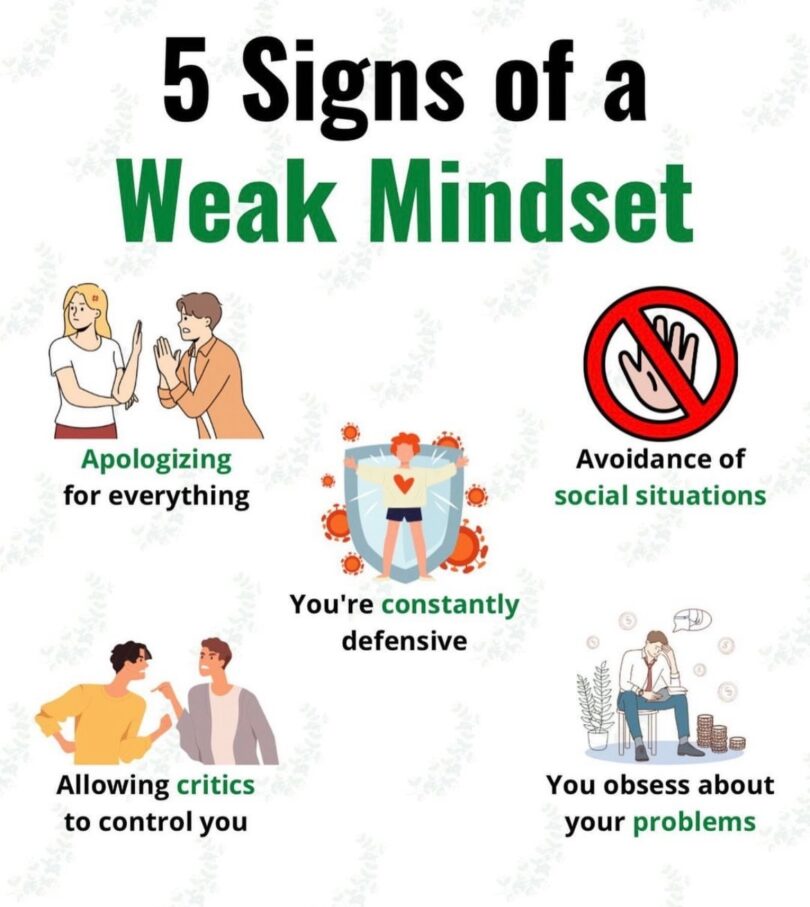5 Signs of a weak mindset
The strength of one’s mindset plays a crucial role in shaping their outlook on life and navigating the challenges they encounter. A strong mindset is characterized by resilience, adaptability, and a willingness to confront obstacles head-on. However, there are certain signs that indicate a weaker mindset, which may hinder personal growth and fulfillment. In this discussion, we will explore five key signs of a weak mindset and delve into their implications on individual behavior and well-being.
SIMILAR: Unahitaji Masaa 22 Kutengeneza BFF Mpya
From over-apologizing to avoiding social situations and allowing criticism to control one’s actions, each sign offers valuable insights into the underlying beliefs and attitudes that contribute to a weaker mindset. By recognizing these signs and understanding their impact, individuals can take proactive steps to cultivate greater mental strength and resilience in their lives.
Table of Contents
1. Apologizing for everything:
Constantly saying sorry, even for minor things, reflects a lack of self-confidence. When you apologize excessively, you diminish your assertiveness, and others may perceive it as a sign of weakness. Over-apologizing may stem from a fear of conflict or rejection, where you feel the need to maintain harmony at any cost. However, it’s important to differentiate between genuine apologies, which acknowledge wrongdoing, and unnecessary ones, which stem from insecurity. Building self-awareness can help in recognizing when apologies are warranted and when they are not, allowing you to assert yourself more confidently in various situations.
2. Avoidance of social situations:
Evading social gatherings or interactions can indicate social anxiety or insecurity. By avoiding social situations, you may miss out on opportunities for personal growth and meaningful connections with others. Stepping out of your comfort zone is crucial for building confidence and resilience in social settings. Seeking support from friends, family, or professionals can provide guidance and encouragement in overcoming social fears. Gradually exposing yourself to social situations, starting with smaller, manageable steps, can help desensitize anxieties and gradually boost your confidence in social interactions.
3. Allowing critics to control you:
Giving too much power to critics can have detrimental effects on your self-esteem and well-being. It’s essential to distinguish between constructive criticism, which can aid in personal growth, and destructive criticism, which serves no purpose other than to tear you down. Learning to filter feedback and focus on constructive input can help you extract valuable insights while disregarding unwarranted negativity. Developing a strong sense of self-worth and confidence in your abilities can act as a shield against unwarranted criticism, allowing you to stay true to yourself despite external opinions. Surrounding yourself with supportive individuals who uplift and encourage you can provide a buffer against negativity and criticism.
SIMILAR: Diamond Platnumz Atangaza Kuachana na Zuchu I’m Single Boy
4. Being constantly defensive:
Reacting defensively to feedback or differing opinions can hinder your personal and professional growth. It may indicate underlying insecurities or a fear of being judged or criticized. While it’s natural to feel defensive when your beliefs or actions are challenged, learning to respond more constructively can foster healthier relationships and open avenues for growth. Practicing active listening and empathy can help you understand others’ perspectives better and respond with greater thoughtfulness and understanding. Learning to accept feedback gracefully, even if it’s critical, is essential for personal development and building resilience in the face of challenges. Recognizing triggers that lead to defensiveness and addressing them proactively can help you manage your reactions more effectively in various situations.
5. Obsessing about problems:
Continuously dwelling on problems without seeking solutions can exacerbate stress and anxiety. When you obsess over problems, you may become stuck in a cycle of negativity, which can impede your ability to see potential solutions and move forward. Seeking perspective from others or professional guidance can provide fresh insights and clarity on how to approach challenges. Developing coping strategies such as mindfulness techniques or problem-solving skills can help you manage difficult situations more effectively. Focusing on what you can control rather than ruminating on problems beyond your influence can promote resilience and well-being, empowering you to navigate challenges with greater ease and confidence.
Check more LIFESTYLE articles;




